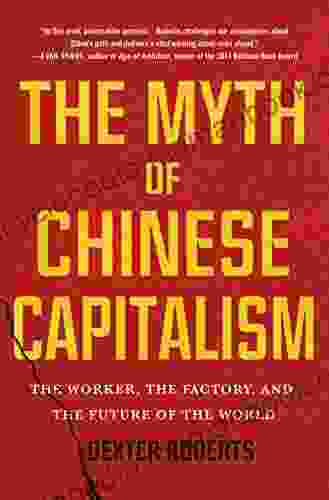The Myth of Chinese Capitalism: Unraveling the Complexities of China's Economic System

4.3 out of 5
| Language | : | English |
| File size | : | 15792 KB |
| Text-to-Speech | : | Enabled |
| Screen Reader | : | Supported |
| Enhanced typesetting | : | Enabled |
| X-Ray | : | Enabled |
| Word Wise | : | Enabled |
| Print length | : | 275 pages |
China's remarkable economic growth in recent decades has captivated the world's attention. The country's rapid ascent from a largely agrarian society to a global economic powerhouse has led many to question the nature of its economic system. The popular narrative suggests that China has embraced capitalism and is following a path similar to that of other Western nations. However, a closer examination reveals a more complex and nuanced reality, challenging the simplistic notion of "Chinese Capitalism."
To understand the true nature of China's economic system, it is crucial to first dispel the myth that it operates solely on capitalist principles. While China has implemented significant market reforms since the late 1970s, the country's economic system remains deeply rooted in socialist ideology. The concept of "Socialism with Chinese Characteristics" underpins the Chinese economic model, which emphasizes a unique blend of state control and market mechanisms.
State-Owned Enterprises: The Pillars of the Chinese Economy
At the heart of China's economic system lies a vast network of state-owned enterprises (SOEs). These enterprises, often dominant players in key industries such as banking, energy, and telecommunications, are directly controlled by the government. SOEs play a significant role in driving economic growth and maintaining stability. They are often used to implement government policies and to ensure that strategic sectors remain under state control.
Despite the presence of SOEs, the Chinese economy has also witnessed a rapid expansion of the private sector. Private businesses, including small and medium-sized enterprises (SMEs) and foreign-invested companies, have become increasingly important in contributing to economic growth and job creation. The government has actively supported the development of the private sector through measures such as reducing regulatory barriers and providing financial assistance.
Market Reform: Embracing the Market While Retaining Control
China's economic transformation has been characterized by a gradual process of market reform, which has introduced elements of capitalism into the socialist system. The most significant reforms were initiated by Deng Xiaoping in the late 1970s and early 1980s. These reforms included the establishment of special economic zones, the liberalization of foreign trade, and the decentralization of economic decision-making.
While market reforms have opened up the Chinese economy and created opportunities for private enterprise, the government has maintained a firm grip on key aspects of the economy. The government sets industrial policies, influences the allocation of resources, and regulates both the state and private sectors. This approach reflects a desire to balance the benefits of market mechanisms with the need for state control.
Economic Growth: A Key Driver of Transformation
China's sustained economic growth has been a major factor in shaping its economic system. The country's average annual GDP growth rate has exceeded 9% for the past three decades, lifting hundreds of millions of people out of poverty. This growth has fueled the expansion of the private sector, the modernization of infrastructure, and the improvement of living standards.
However, the rapid economic growth has also brought with it challenges such as regional imbalances, environmental degradation, and social inequality. The government is grappling with these challenges while continuing to maintain a high growth rate. The sustainability of China's economic growth in the long term will depend on its ability to address these issues effectively.
Deng Xiaoping to Xi Jinping: Continuities and Changes
The leadership of Deng Xiaoping and Xi Jinping has had a profound impact on the development of China's economic system. Deng, known as the "Father of Chinese Reform," initiated the policies that set China on the path to economic liberalization. He famously declared that "Reform and opening up" were "essential for socialism."
Xi Jinping, who assumed power in 2012, has continued the reform process while emphasizing the role of state-owned enterprises and the strengthening of the Communist Party's control over the economy. Xi's policies, such as the "Belt and Road Initiative" and the "Made in China 2025" plan, aim to enhance China's global economic influence and technological competitiveness.
: Beyond the Binary of Capitalism and Socialism
The Chinese economic system defies easy categorization as either capitalist or socialist. It is a unique blend of state control, market mechanisms, and socialist ideology. While the country has embraced elements of capitalism through market reform, the government retains significant influence over the economy. The concept of "Socialism with Chinese Characteristics" captures the essence of this hybrid system, which has enabled China to achieve remarkable economic growth while maintaining a strong socialist foundation.
As China continues to develop and evolve, its economic system will undoubtedly undergo further changes. The country faces challenges such as the slowing of economic growth, the need to address social inequality, and the increasing competition from other global powers. How China navigates these challenges will shape the future of its economic system and its role in the global economy.
To truly understand China's economic system, it is essential to move beyond simplistic labels and embrace a nuanced perspective that acknowledges the interplay of market forces, state control, and socialist ideology. Only then can we fully grasp the complexities of this unique and ever-evolving system.
Further Reading
- China's Economic System: A Primer - Brookings
- China's Economic Model - Council on Foreign Relations
- Is China State Capitalist? - London School of Economics
Glossary
- Capitalism: An economic system characterized by private ownership of property, free market competition, and profit-seeking behavior.
- Socialism: An economic system characterized by public ownership of property, central planning, and the distribution of goods and services based on need.
- State-Owned Enterprise (SOE): A company that is owned and controlled by the government.
- Market Reform: Measures taken to introduce market mechanisms into a previously socialist economy.
- Socialism with Chinese Characteristics: The official ideology of the Communist Party of China, which combines elements of socialism and capitalism.
4.3 out of 5
| Language | : | English |
| File size | : | 15792 KB |
| Text-to-Speech | : | Enabled |
| Screen Reader | : | Supported |
| Enhanced typesetting | : | Enabled |
| X-Ray | : | Enabled |
| Word Wise | : | Enabled |
| Print length | : | 275 pages |
Do you want to contribute by writing guest posts on this blog?
Please contact us and send us a resume of previous articles that you have written.
 Top Book
Top Book Novel
Novel Fiction
Fiction Nonfiction
Nonfiction Literature
Literature Paperback
Paperback Hardcover
Hardcover E-book
E-book Audiobook
Audiobook Bestseller
Bestseller Classic
Classic Mystery
Mystery Thriller
Thriller Romance
Romance Fantasy
Fantasy Science Fiction
Science Fiction Biography
Biography Memoir
Memoir Autobiography
Autobiography Poetry
Poetry Drama
Drama Historical Fiction
Historical Fiction Self-help
Self-help Young Adult
Young Adult Childrens Books
Childrens Books Graphic Novel
Graphic Novel Anthology
Anthology Series
Series Encyclopedia
Encyclopedia Reference
Reference Guidebook
Guidebook Textbook
Textbook Workbook
Workbook Journal
Journal Diary
Diary Manuscript
Manuscript Folio
Folio Pulp Fiction
Pulp Fiction Short Stories
Short Stories Fairy Tales
Fairy Tales Fables
Fables Mythology
Mythology Philosophy
Philosophy Religion
Religion Spirituality
Spirituality Essays
Essays Critique
Critique Commentary
Commentary Glossary
Glossary Bibliography
Bibliography Index
Index Table of Contents
Table of Contents Preface
Preface Introduction
Introduction Foreword
Foreword Afterword
Afterword Appendices
Appendices Annotations
Annotations Footnotes
Footnotes Epilogue
Epilogue Prologue
Prologue Carver Pike
Carver Pike Christopher Burkett
Christopher Burkett Helen Nugent
Helen Nugent Tatsuya Endo
Tatsuya Endo K Loraine
K Loraine Souchou Yao
Souchou Yao Nolan L Cabrera
Nolan L Cabrera Erich Joachimsthaler
Erich Joachimsthaler Mark Phillips
Mark Phillips Keith Blenman
Keith Blenman Stella Andrews
Stella Andrews Jamie Winters
Jamie Winters Robert C Martin
Robert C Martin Holly Sheidenberger
Holly Sheidenberger Sarah Perrier
Sarah Perrier Benedict Patrick
Benedict Patrick Dav Pilkey
Dav Pilkey David Kindopp
David Kindopp Sonja Linden
Sonja Linden Jane Lebak
Jane Lebak
Light bulbAdvertise smarter! Our strategic ad space ensures maximum exposure. Reserve your spot today!

 Christopher WoodsDelve into the Enigmatic World of Currencies: An In-depth Exploration with...
Christopher WoodsDelve into the Enigmatic World of Currencies: An In-depth Exploration with... Stanley BellFollow ·6.5k
Stanley BellFollow ·6.5k Efrain PowellFollow ·9k
Efrain PowellFollow ·9k Lee SimmonsFollow ·19.7k
Lee SimmonsFollow ·19.7k Davion PowellFollow ·16.5k
Davion PowellFollow ·16.5k Edgar HayesFollow ·18.6k
Edgar HayesFollow ·18.6k Reginald CoxFollow ·14.6k
Reginald CoxFollow ·14.6k Kelly BlairFollow ·5.2k
Kelly BlairFollow ·5.2k Sam CarterFollow ·18.1k
Sam CarterFollow ·18.1k

 Fabian Mitchell
Fabian MitchellTen Thousand Spirals: Leccion Inagural Del Curso...
Ten Thousand...

 Howard Blair
Howard BlairThe Captivating Collection of High School Romance Poetry
Love's First...
4.3 out of 5
| Language | : | English |
| File size | : | 15792 KB |
| Text-to-Speech | : | Enabled |
| Screen Reader | : | Supported |
| Enhanced typesetting | : | Enabled |
| X-Ray | : | Enabled |
| Word Wise | : | Enabled |
| Print length | : | 275 pages |

















